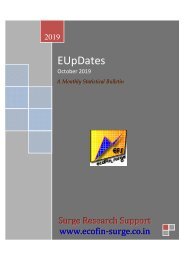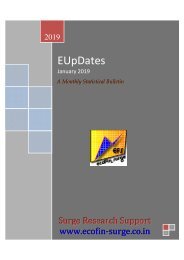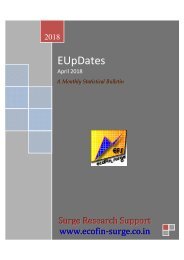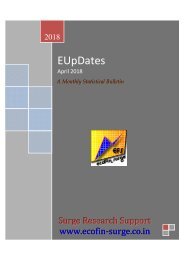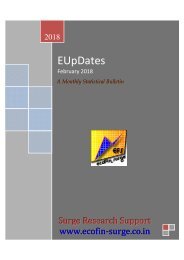EUpDates—A Monthly Statistical Bulletin of Economic Indicators
The Monthly e-Bulletin for Economic/Financial Market Indicators—over 30 tables and charts and a review of the economy, helps you and/or your students to stay informed about the Indian and global economy and financial markets.
The Monthly e-Bulletin for Economic/Financial Market Indicators—over 30 tables and charts and a review of the economy, helps you and/or your students to stay informed about the Indian and global economy and financial markets.
You also want an ePaper? Increase the reach of your titles
YUMPU automatically turns print PDFs into web optimized ePapers that Google loves.
Liquidity Adjustment Facility: Fixed Rate Reverse Repo Rate
As I have mentioned earlier, the surplus liquidity in the banking system has risen significantly in the wake of government spending and the
various liquidity enhancing measures undertaken by the RBI. On April 15, the amount absorbed under reverse repo operations was ₹6.9 lakh
crore. In order to encourage banks to deploy these surplus funds in investments and loans in productive sectors of the economy, it has been
decided to reduce the fixed rate reverse repo rate under the liquidity adjustment facility (LAF) by 25 basis points from 4.0 per cent to 3.75 per
cent with immediate effect. The policy repo rate remains unchanged at 4.40 per cent, and the marginal standing facility rate and the Bank Rate
remain unchanged at 4.65 per cent.
Ways and Means Advances for States
On April 1, 2020 the RBI had announced an increase in the ways and means advances (WMA) limit of states by 30 per cent. It has now been
decided to increase the WMA limit of states by 60 per cent over and above the level as on March 31, 2020 to provide greater comfort to the
states for undertaking COVID-19 containment and mitigation efforts, and to plan their market borrowing programmes better. The increased limit
will be available till September 30, 2020.
Regulatory Measures
On March 27, 2020 the Reserve Bank had announced certain regulatory measures to mitigate the burden of debt servicing brought about by
disruptions on account of COVID-19 and to ensure the continuity of viable businesses. Based on a review of the rapidly evolving situation, and
consistent with the globally coordinated action committed to by the Basel Committee on Banking Supervision to alleviate the impact of Covid-19
on the global banking system, additional regulatory measures are being announced today.
Asset Classification
Economic activity has come to a standstill during the period of the lockdown, with consequential lingering effects which have unambiguously
affected the cash flows of households and businesses. On March 27, 2020 the RBI had permitted lending institutions (LIs) to grant a moratorium
of three months on payment of current dues falling between March 1 and May 31, 2020. It is recognized that the onset of COVID-19 has also
exacerbated the challenges for such borrowers even to honour their commitments fallen due on or before February 29, 2020 in Standard
Accounts. The Basel Committee on Banking Supervision (BCBS) has taken cognizance of the financial and economic impact of COVID-19 and
very recently announced that “………. the payment moratorium periods (Public or granted by banks on a voluntary basis) relating to the
COVID-19 outbreak can be excluded by banks from the number of days past due” in respect of NPA recognition.
Therefore, it has been decided that in respect of all accounts for which lending institutions decide to grant moratorium or deferment, and which
were standard as on March 1, 2020, the 90-day NPA norm shall exclude the moratorium period, i.e., there would an asset classification standstill
for all such accounts from March 1, 2020 to May 31, 2020. NBFCs, which are required to comply with Indian Accounting Standards (IndAS),
may be guided by the guidelines duly approved by their boards and as per advisories of the Institute of Chartered Accountants of India (ICAI) in
recognition of impairments. In other words, NBFCs have flexibility under the prescribed accounting standards to consider such relief to their
borrowers.
At the same time, we are cognizant of the risk build-up in banks’ balance sheets on account of firm-level stress and delays in recoveries. With the
objective of ensuring that banks maintain sufficient buffers and remain adequately provisioned to meet future challenges, they will have to
maintain higher provision of 10 per cent on all such accounts under the standstill, spread over two quarters, i.e., March, 2020 and June, 2020.
These provisions can be adjusted later on against the provisioning requirements for actual slippages in such accounts.
Extension of Resolution Timeline
Under RBI’s prudential framework of resolution of stressed assets dated June 7, 2019, in the case of large accounts under default, Scheduled
Commercial Banks, AIFIs, NBFC-ND-SIs and NBFC-D are currently required to hold an additional provision of 20 per cent if a resolution plan
has not been implemented within 210 days from the date of such default. Recognizing the challenges to resolution of stressed assets in the
current volatile environment, it has been decided that the period for resolution plan shall be extended by 90 days. Details will be spelt out in the
circular.
Distribution of Dividend
It is imperative that banks conserve capital to retain their capacity to support the economy and absorb losses in an environment of heightened
uncertainty. It has, therefore, been decided that in view of the COVID-19-related economic shock, scheduled commercial banks and cooperative
banks shall not make any further dividend payouts from profits pertaining to the financial year ended March 31, 2020 until further instructions.
This restriction shall be reviewed on the basis of the financial position of banks for the quarter ending September 30, 2020.
E-UpDates April 2020
29
Surge Research Support






